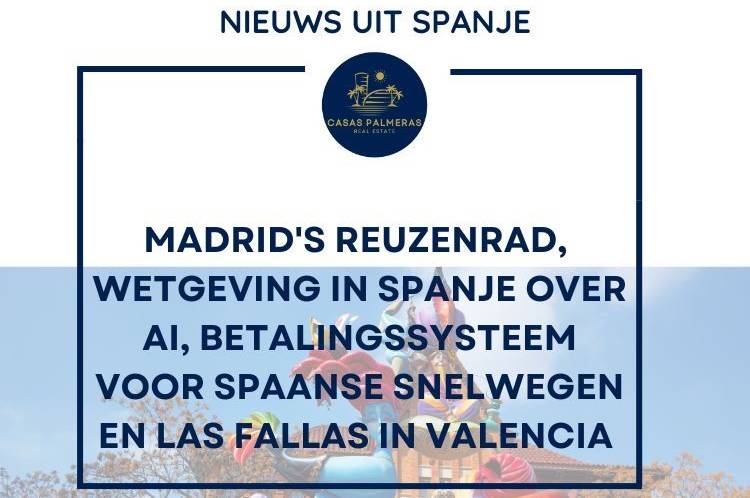This was the news from Spain

Madrid wants the world's tallest ferris wheel, over 260 meters high
A recent study, commissioned by the mayor of Madrid, has shown that it is technically possible to build a 260-meter-high Ferris wheel in Parque de Arganzuela, located in the Spanish capital. This ambitious project would become the largest Ferris wheel in the world and a major new tourist attraction for the city.
The proposed Ferris wheel would be significantly taller than the current tallest, the High Roller in Las Vegas, which reaches a height of 167.6 meters. For comparison, the famous London Eye is 135 meters tall. Meanwhile, the Ain Dubai in the United Arab Emirates, currently under construction, will be 210 meters high, making it the tallest in the region.
The plan for the Madrid Ferris wheel includes 36 cabins, each accommodating 25 people, resulting in a total capacity of 900 passengers per ride. Each ride would last approximately 30 minutes, allowing visitors to enjoy panoramic views of the city.
Although the study confirmed the project's technical feasibility, several challenges and considerations remain. One major concern is how the Ferris wheel will integrate into the existing cityscape and the possible impact it may have on the surroundings. Parque de Arganzuela is a popular green space, cherished by both locals and tourists, raising concerns about the effects that such a large structure could have on the park's atmosphere.
Additionally, logistical and infrastructural aspects must be considered. Constructing a Ferris wheel of this magnitude requires extensive construction work, which could temporarily disrupt the surrounding area. Measures must also be taken to manage traffic flow to and from the park, especially if the Ferris wheel becomes a popular new attraction.
Project financing is another crucial factor. The cost of constructing the Ferris wheel is estimated at 120 million euros, with a proposed mix of public and private investments. Private investors could help alleviate the financial burden on the city, but this would require negotiations regarding ownership and profit distribution.
Local community reactions to the proposal are mixed. Some see the Ferris wheel as an exciting addition that could bring economic benefits and boost tourism. Others are concerned about potential negative impacts on the environment, congestion, and the possible transformation of Parque de Arganzuela’s ambiance.
If the project is approved, construction is expected to take approximately two years, meaning the Ferris wheel could be operational by 2027. The city hopes the Ferris wheel will not only become a new tourist attraction but also a symbol of modern development and innovation in Madrid.
Spain introduceslaw requiring AI-generated content to be clearly identifiable
The Spanish government recently approved a new bill ensuring that everyone can easily recognize whether a photo, video, or audio recording was created using artificial intelligence (AI). Companies will now be required to indicate when an image, video, or audio clip has been generated or modified by a computer.
This law aims to prevent deception through deepfakes, such as AI-generated photos and videos in which people appear to say or do things they never actually did. Such techniques are increasingly being misused, for example, to spread false information. As a result, companies are now legally obligated to be transparent about AI usage. Failure to comply could result in fines of up to 35 million euros.
In addition to mandating AI-generated content labeling, the law also prohibits using AI to manipulate people without their awareness. This includes, for example, chatbots that encourage gambling addicts to spend money. Such practices will be strictly penalized.
The law also provides protection for vulnerable groups, such as children and people with disabilities. AI cannot be used to deceive or manipulate them. One prohibited practice is the use of AI programs that encourage children to engage in dangerous activities.
Some AI systems, such as those used in schools, hospitals, or law enforcement, are considered particularly high-risk. These systems will be subject to strict regulations to ensure they operate fairly and safely.
A special agency, the Agencia Española de Supervisión de la Inteligencia Artificial (AESIA), will be established to oversee compliance with this law. This organization will monitor AI applications and ensure AI does not contribute to discrimination.
This Spanish law aligns with regulations being introduced by the European Union, positioning Spain as a pioneer in the safe and responsible use of artificial intelligence.
In summary, this new law ensures that companies must clearly indicate when they use AI. Manipulative practices are banned, vulnerable groups receive better protection, and there will be strict oversight of AI systems that significantly impact daily life. Spain is taking steps to ensure AI is used safely and ethically.
Paying for use of Spanish highways is getting closer
Spain is considering implementing a toll system for the use of autovías (highways) to cover road maintenance costs. This proposal was previously rejected but is now being reconsidered due to pressure from Seopan, a trade association of construction companies. Seopan proposes a fee of 2.8 cents per kilometer for passenger cars and 8.2 cents per kilometer for trucks, based on road investments and registered traffic. Previous proposals suggested a lower fee of just 1 cent per kilometer, making the new rates a significant increase. For a 100-kilometer trip, a driver would have to pay 2.80 euros.
The system could operate using "free-flow" technology, eliminating the need for physical toll booths. License plates would be automatically registered, and users would receive an invoice afterward. This would prevent traffic congestion and ensure smoother traffic flow.
Critics point out potential drawbacks. The additional costs could be a heavy burden on drivers, especially given the rising cost of living. Furthermore, introducing tolls could create inequality between regions where some roads are currently toll-free. Another debate concerns the allocation of revenue: will the money truly be used for highway maintenance, or will it be redirected elsewhere?
Strict control will be necessary to ensure that foreign drivers also pay. Many motorists are accustomed to free highways, so convincing them of the benefits will be a challenge. Clear explanations must be provided on how toll revenues will contribute to improving roads and traffic safety.
The debate over tolls in Spain remains complex and sensitive. The final decision will depend on balancing infrastructure costs with the financial burden on road users.
Valencia celebrates the 'Las Fallas' festival
It is that time of year again when Valencia, from March 15 to 19, is entirely dedicated to the famous Fallas festival. Las Fallas is a traditional festival in honor of Saint Joseph, celebrated annually in Valencia. The name "Fallas" refers not only to the festival itself but also to the unique sculptures built specifically for this event, usually made of wood and polystyrene. The festival officially begins on the last Sunday of February or the first Sunday of March with the opening ceremony "La Crida" at the iconic Torres de Serrano and ends on March 19 with "La Crema," the burning of the Fallas sculptures.
Every neighborhood in the city has a Fallas association, known as a Casal Faller (or comissió fallera), which raises money throughout the year to fund the festival and create the sculptures. In 2016, Las Fallas was declared a UNESCO Intangible Cultural Heritage of Humanity.
The festival includes various events such as La Mascletà (daily fireworks), L'Ofrena de Flors (flower offerings to the Virgin of the Forsaken), and the grand Nit del Foc (Night of Fire). The celebration culminates with the Cremà on March 19, where the Fallas sculptures are set ablaze in a spectacular farewell to the festivities.
It is a breathtaking festival of fire, art, and tradition, where the city fully immerses itself in the celebration!









